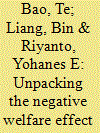|
|
|
Sort Order |
|
|
|
Items / Page
|
|
|
|
|
|
|
| Srl | Item |
| 1 |
ID:
186616


|
|
|
|
|
| Summary/Abstract |
China has been making efforts to reduce the number of executions via a recentralized review process under judicial guidelines. This study analyzes 650 Death Sentence Review Transcripts collected from China Judgments Online, aiming to decipher patterns and variations of death review decisions via descriptive facts and circumstances. We find that marital or domestic violence, offender's guilty conscience or forgiveness by victim's family, and insufficient heinousness underline the disapproval patterns. In contrast, large number of victims or victim deaths, use of weapon, brutal crime nature, being a ringleader in violent crimes, and significant drug weight in drug crimes describe the approval patterns with a general lack of recognition for mitigating circumstances. However, significant variations existed among approved cases, involving defendants who caused a single death for domestic or marital dispute, had no criminal record, committed a crime of passion, or carried low-purity drugs or acted as drug mules. These variations raise the question of whether the Supreme People's Court maintains a consistent standard following its own guidelines.
|
|
|
|
|
|
|
|
|
|
|
|
|
|
|
|
| 2 |
ID:
129447


|
|
|
|
|
| Publication |
2013.
|
| Summary/Abstract |
Notwithstanding the role that opium and narcotics have played in China's history, drug use, trafficking and other drug-related problems have been consistently condemned by the Chinese government as social vices. After being a 'drug-free' nation from the 1950s to the 1970s, drug problems resurfaced in the 1980s and China was forced to deal with such problems once again. The Chinese government is well known for its tight control over the media, and for its ability to utilize propaganda to win public support and carry out its policies. However, the Chinese government's use of the media and propaganda to deal with drug issues has never been explored. Based on longitudinal data collected from the People's Daily (from 1946 to 2009), this study examines two key issues: the ways in which the government has utilized ideology in its official stories over time, and the means through which the government has tried to re-establish its drug control in the 21st century. The data suggest that the use of 'hard-core' ideology as a tool has not only drastically declined over time but also undergone significant modifications. The Chinese government has adopted a multifaceted approach to drug control and it has managed to present a unified voice in the media in combatting drug problems.
|
|
|
|
|
|
|
|
|
|
|
|
|
|
|
|
| 3 |
ID:
135427


|
|
|
|
|
| Summary/Abstract |
Job satisfaction has long been argued as an important indicator of both the quality of an individual’s working life and organizational efficiency. Using the person-environment fit theory as an interpretive framework,Job satisfaction has long been argued as an important indicator of both the quality of an individual’s working life and organizational efficiency. Using the person-environment fit theory as an interpretive framework, this study explores the extent of job satisfaction among Chinese criminal defense lawyers and its key determinants. Contrary to findings in Western studies claiming that overall job satisfaction is more likely to be affected by “job-content” than “job-context” variables, the results of our survey data suggest that in China job satisfaction is primarily driven by “job-context,” not by “job-content,” variables. In addition, professional commitment significantly impacts overall job satisfaction. An in-depth analysis of the context vs. content variables sheds light on both the progress and the limitations of the judicial reforms in China.
|
|
|
|
|
|
|
|
|
|
|
|
|
|
|
|
| 4 |
ID:
182796


|
|
|
|
|
| Summary/Abstract |
Recently, concerns have been raised on the adverse impacts of social media on people's subjective well-being. Using a large and representative sample of Chinese individuals, we explore the effects of social media browsing and social media communication on users' life satisfaction. The results show that while social media browsing has a strong negative impact on users' subjective well-being, there is no significant impact generated by social media communication. The relative income and social comparison are the main drivers of the result. The negative impact of social media browsing is more pronounced for low-income people than for high-income people. We do not find support for other possible mechanisms like information cocoons of information fragmentation.
|
|
|
|
|
|
|
|
|
|
|
|
|
|
|
|
|
|
|
|
|